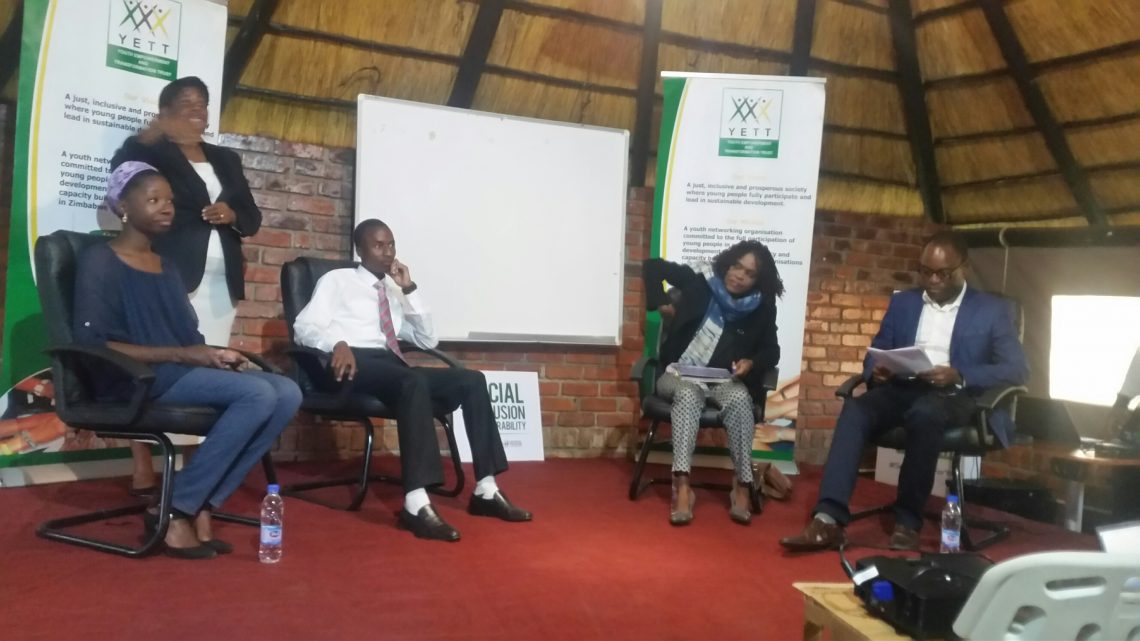By Byron Mutingwende
Young people who constitute the bulk of the Zimbabwean population are calling for spaces to fully participate in issues of sustainable development.
Speaking at a discussion series organised by the Youth Empowerment and Transformation Trust (YETT) in Harare on 21 June 2018, Nyasha Sengai, the Director of Source International and the Global Coordinator of the One Billion Rising Campaign said there was need for youths to endeavour to take leadership positions beyond the sphere of politics alone.
“Young people should seek to take up leadership positions beyond politics alone. They need to craft ideas and strategies that will secure them a bright future through active involvement in the economy instead of just waiting at the periphery and exclusively seeking to acquire political power only,” Sengai said.
She criticised the notion being spearheaded by certain youths around the entrenchment of a generation consensus that seems to be centred around campaigning for a single political party.
“The campaign to involve youths at the driving seat of leadership should speak broadly to developmental issues. As youths we should push for positive change and engagement of all age groups through dialogue to get what is best for all the citizens. In that regard, I support inter-generational consensus as opposed to generational consensus,” Sengai said.
She encouraged young people to look at issues of development with lenses that go beyond the electoral cycle and emphasised the importance of involving grassroots people in shaping narratives that will propel them into leadership positions.
Gift Ostallos Siziba, a human rights campaigner, said from a historical perspective, the political discourse has always been shaped by from the lenses of a generational approach.
“It’s universal that politics is shaped and analysed from a generational point of view, from the USA to South Africa and many other countries. In the 1960s, the youths in the then Rhodesia got fed up with draconian laws like the Land Husbandry Act and the general discrimination perpetrated against the black majority by the white minority supremacists until they decided to take up arms against the system. They successfully executed the armed struggle with the blessings of their parents and older generations until they won independence in 1980 and formed the government.
“That same generation reconvened in 2008 after former President Robert Mugabe lost the first round of voting to the late MDC Leader Morgan Tsvangirai and agreed to stage an election run-off to reclaim the lost power to govern. With the generational consensus, they are still in government. As the youths, we feel it is now time for young people to lead the politics, particularly through campaigning for the young and energetic leader of the MDC Alliance Nelson Chamisa to take over the presidency of the country,” Siziba said.
He bemoaned the fact that the middle-aged generation of the ilk of Econet Founder Strive Masiyiwa and Telecel Founding Director and many other business people as well as engineers, lawyers and technicians were hounded out of the country by the older generation at the helm of politics in Zimbabwe.
In a pre-recorded interview, Douglas Mahiya, the Spokesperson of the Zimbabwe National Liberation War Veterans Association praised his generation for taking up arms against the then British colonial government and affording freedom to the citizens who previously groaned under the yoke of oppression.
Namatai Kwekweza, an entrepreneur and feminist, was of the opinion that there was need for dialogue among both the young and old in order to agree on ways of taking the country out its present social, political and economic challenges.
“It is important for everyone, as was the case with Nelson Mandela, who in 1962 said he sought to fight against dominance by both blacks and whites in any capacity. I therefore support inter-generational consensus that encapsulates the representation of diverse generations. We should avoid power politics and encourage the participation of all citizens in their diversity, cascading through the inter-generations,” Kwekweza said.






